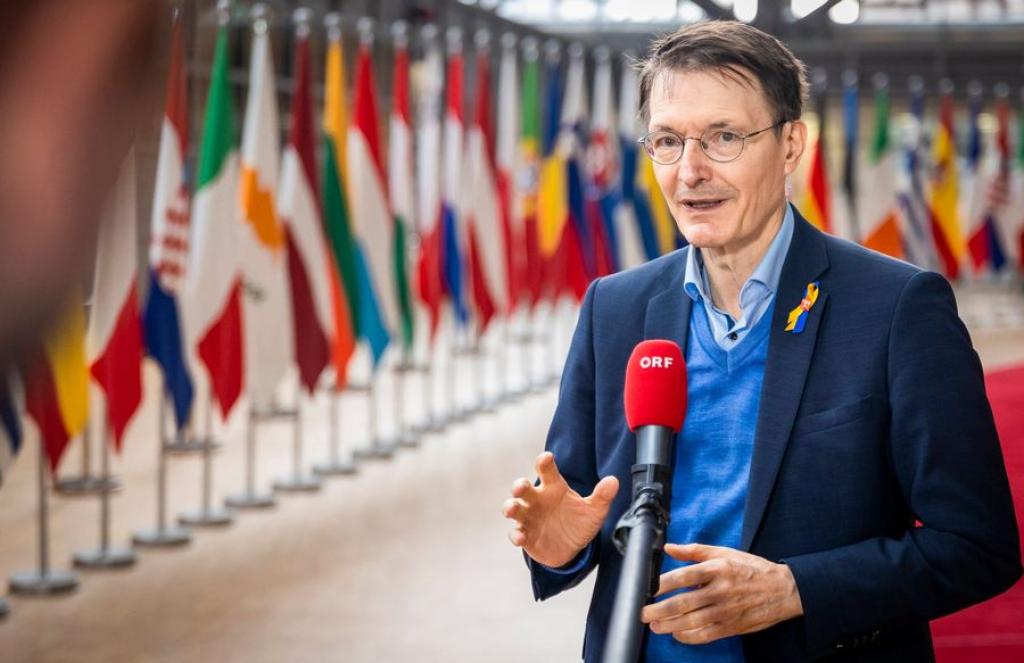Thessaloniki gets ready for its metro launch in November
The underground rapid transit lines have been under construction for almost two decades due to various project delays
 TheMayor.EU logo
TheMayor.EU logo 
Karl Lauterbach at the meeting of European Health Ministers, at the end of March, talking about healthcare in the Urkaine crisis, Source: The German Health Ministry on Facebook
Health authorities cannot predict the future development of the pandemic and past experience shows – autumn is the season of ‘the spread’
Today, the German Minister of Health Karl Lauterbach announced that authorities are trying to prepare legislation to re-introduce compulsory masks indoors this autumn. Despite Covid cases hitting their lowest point since the start of the year, Minister Lauterbach explained that there is a possibility of a resurgent pandemic as temperatures start going down.
At the same time, the provisional Infection Protection Act (Infektionsschutzgesetz) which the government used to enact COVID-19 legislation will expire in September. According to an interview for the ZDF, a German public radio station, Lauterbach said that in the pandemic question will have to be revisited in parliament. He continued: "That could come again. I also think it is absolutely necessary that we open up this possibility for the autumn".
An interesting point about the Infection Protection Act is that it does not describe what kind of health regulations the government should enforce. Instead, it gives authorities the right to act quickly and decisively as the situation progresses.
Lauterbach explained that health authorities are working on a new health concept for the autumn and that he will present it soon. Part of the strategy focuses on vaccines as he said that Germany plans to buy additional doses for three different corona variants - the Wuhan variant, a pure omicron vaccine and a combination vaccine.
He also said that by this point this is common knowledge that some of the vaccines will quite possibly end up expired and unusable. However, he also said that health authorities do not know what is coming and they want to be prepared as best as they can be.
Since April, Germany has removed most pandemic restrictions, including mask mandates in most places – a stark contrast to a proposed vaccine mandate during Christmas. General mask requirements for events or shopping as well as 2G and 3G regulations have been removed.
Right now, the policy of authorities centres around something that can only be described as a better-safe-than-sorry approach. This means that people should wear masks on public transport, on trains, in hospitals and clinics, as well as in nursing homes. At the same time, many federal states also have additional rules for cultural events that are not nationally mandated.

The underground rapid transit lines have been under construction for almost two decades due to various project delays

Now you can get your wine in Talence by paying directly in Bitcoin

That’s because the state has to spend money on updating the railway infrastructure rather than subsidizing the cost of the popular pass

Rethinking renewable energy sources for the urban landscape

The examples, compiled by Beyond Fossil Fuels, can inform and inspire communities and entrepreneurs that still feel trepidation at the prospect of energy transition

Now you can get your wine in Talence by paying directly in Bitcoin

The 10th European Conference on Sustainable Cities and Towns (ESCT) sets the stage for stronger cooperation between the EU, national and local level to fast track Europe's transition to climate neutrality.

At least, that’s the promise made by the mayor of Paris, Anne Hidalgo

The underground rapid transit lines have been under construction for almost two decades due to various project delays

At least, that’s the promise made by the mayor of Paris, Anne Hidalgo

Hostal de Pinós is located in the geographical centre of the autonomous region

Despite its church-y name, the district has long been known as the hangout spot for the artsy crowds

Urban dwellers across the EU are having a say in making their surroundings friendlier to people and the environment.

Forests in the EU can help green the European construction industry and bolster a continent-wide push for architectural improvements.

Apply by 10 November and do your part for the transformation of European public spaces

An interview with the Mayor of a Polish city that seeks to reinvent itself

An interview with the newly elected ICLEI President and Mayor of Malmö

A conversation with the Mayor of Lisbon about the spirit and dimensions of innovation present in the Portuguese capital














